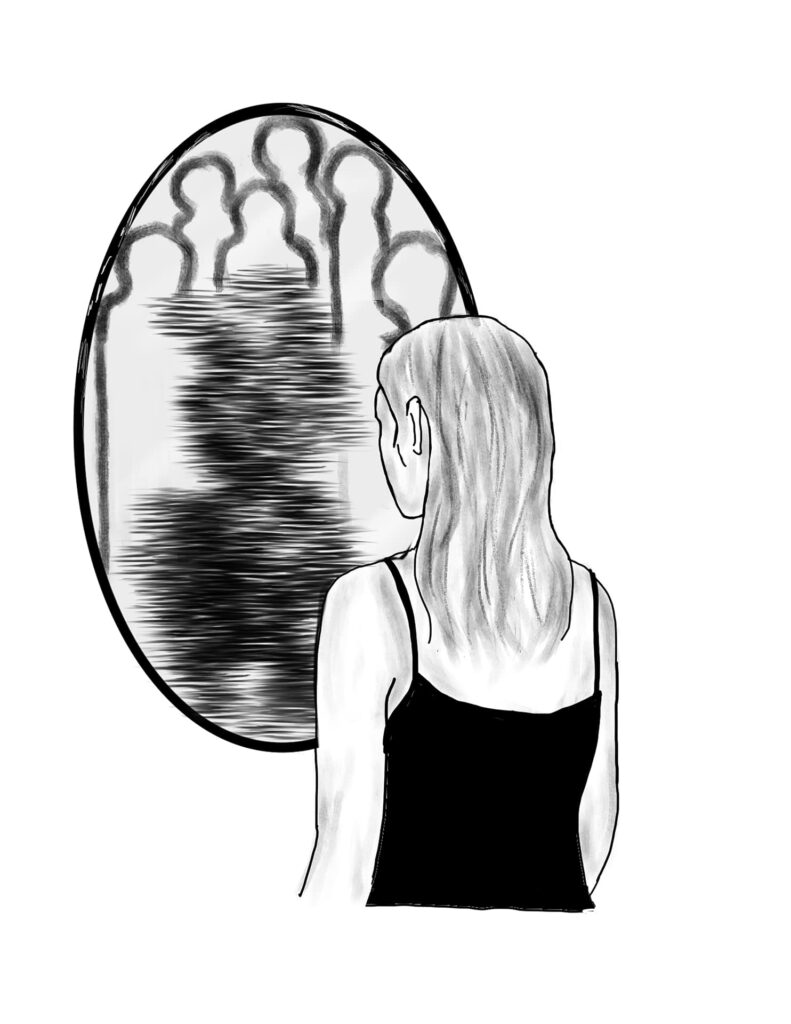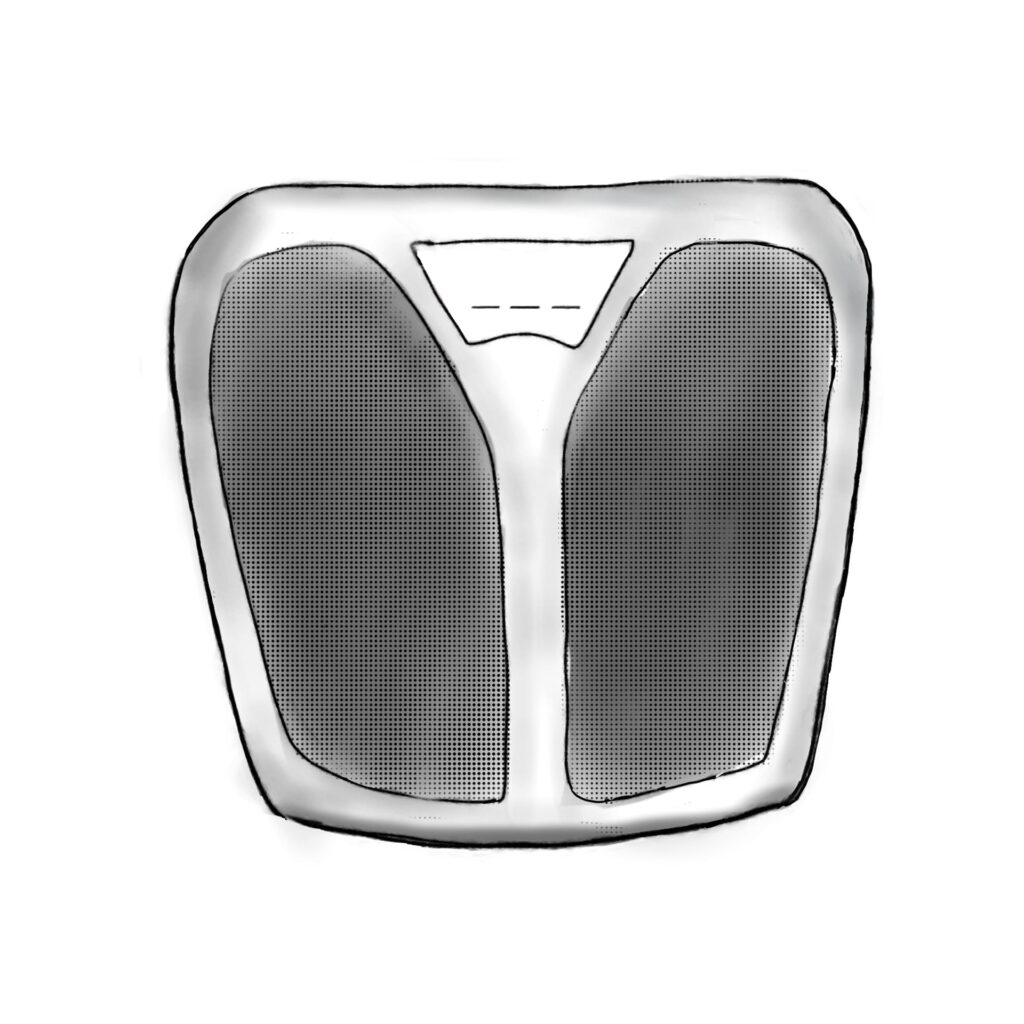The other side of the scale
Measuring my worth but weighed down by comparisons
January 31, 2025 | story by Brooke Davidson
illustrations by Eva Lu
This story is from Atrium’s Winter 2024 magazine, which released December 2024.
“Has your mom been feeding you?”
Surrounded by the white walls and paper-lined tables of an exam room, I was puzzled by the pediatrician’s question.
“Of course,” I responded, realizing this question had prompted her to close the door.
The scale blinked. Double digits again. The spot where the third digit should have been was as blank as the look on the pediatrician’s face. She saw only a number, not the story behind it, which started 21 years ago.
My siblings and I were born at 27 weeks, so the Davidson triplets celebrate birthdays in January instead of April. The Neonatal Intensive Care Unit was all we knew for the first three months of our lives, and our life expectancy wasn’t high.
My sister, brother and I weighed only 2 pounds each at birth, missing out on the body fat babies pack on in the third trimester. I’ve always been the smallest triplet, and my brother and sister overcame this struggle earlier than I could. For years, the plot point comparing my height to my weight was off the charts — but in the wrong direction. While most teens worry about gaining weight, society expected me to.
Every woman can find something wrong with her body, something to be insecure about. If you’re not overweight, people think it is OK to talk about it. But the attention made me feel abnormal, and as I grew up, comments I once viewed as positive started to sound vindictive.

“Go get another plate, Brooke,” a friend would tell me at lunchtime, even though my portion was identical to others around the high school cafeteria table. “You need to eat more.” I could sense the jealousy under the surface: Let’s all look at Brooke. Let’s point her out so we can feel right in our own bodies, however they may be.
But what about how I felt about myself?
After a teammate scoffed it didn’t fit me, I rolled up my green lacrosse skirt, twisting it back into place every time the referee blew the whistle. I had to find excuses not to donate blood for the National Honor Society, as I didn’t meet the weight requirements.
One summer toward the end of high school, a friend invited my sister and me to swim in her backyard pool. We changed into our bathing suits, only to step outside to unexpected scrutiny.
“Great,” our host said. “I guess I’ll just go kill myself.”
My stomach sank. All I could manage was an awkward laugh. I couldn’t help how my body looked, just as she couldn’t change her own in that moment.
Most women don’t like wearing a bathing suit because of their self-consciousness. When I wear one, I feel obligated to shield others from their insecurities and ignore my own. I never wanted to become the cause or reminder of an internal battle, especially for someone I was close to.
I acknowledge I’m extremely lucky to be this healthy after my life-threatening beginning, and this impacts the way I see the world today. I’m thankful. But luck doesn’t account for the emotional tug-of-war that leaves my self-perception frayed, even as I’m guiltily grateful to be thin in an envious society.
When I’m alone, I can look in the mirror for hours if there are catchy songs playing in the background, posing and lip-synching like I’m the main character in a 2000s movie. It’s when other people are present that insecurity creeps up behind me and pulls me onto the sidelines. Whether I’m trying to see if I have the correct form in a group workout at the gym or putting makeup on with friends before a function, it’s difficult to lock eyes with my reflection. Personal doubt descends like a layer of condensation, clouding the mirror.

This is my version of survivor’s guilt, which has kept me from accepting me for me. I strive to be what society wants but not bring attention to myself. I need to blend in but also live up to modern standards.
During my first semester of college, the TA of my psychology course taught us anyone born before 32 weeks has a physical or learning disability. No qualifiers like “may have” or “could have” softened her PowerPoint slide. I thought of raising my hand to testify, like I was some sort of witness. Was I the exception? Was it nothing short of a miracle I, along with my brother and sister, had defied those odds?
This became the catalyst of my introspection: remembering the “why” behind why I am underweight. Yes, it’s unnatural — but it’s also a reminder of where I’ve come from, of what I’ve overcome. I can’t base how I feel about myself on others’ attitudes toward me. I’ve learned I need to accept what is regular for me, no matter what side of the scale that’s on.
Society’s fixation on weight is hypocritical. For most people, if they wanted to be “healthy,” they’d lose weight. For people like me, I’d have to gain it. Your perception of health shouldn’t have to revolve around a number, a statistic comparing you to someone else’s average.
During my checkup before heading to college, I saw something that would leave most people unfazed. But as a graduate of months in the NICU, I smiled, knowing my body was developing along its own timeline.
The scale beeped. Three digits.